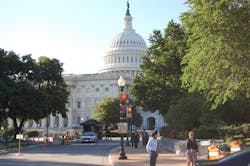With the highway trust fund facing a cash shortfall in the near future, Sens. Chris Murphy (D-CT) and Bob Corker (R-TN) on June 18 proposed to increase federal gasoline and diesel taxes by six cents in each of the next two years and indexing the fuel tax to inflation thereafter.
The 12-cent increase will provide enough funding to offset current authorized spending levels and restore the buying power of the gas tax when it was last increased in 1993, they said.
“For too long, Congress has shied away from taking serious action to update our country’s aging infrastructure,” said Murphy in announcing the proposal. “By modestly raising the federal gas tax, we can address a crippling economic liability for this country—the inability to finance long-term improvements to our crumbling national infrastructure.”
As a Republican, Corker’s sponsorship of a tax increase is particularly noteworthy. “Growing up in Tennessee as a conservative, I learned that if something was important enough to have, it was important enough to pay for,” he said.
“In Washington, far too often, we huff and puff about paying for proposals that are unpopular, yet throw future generations under the bus when public pressure mounts on popular proposals that have broad support,” Corker said. “Congress should be embarrassed that it has played chicken with the highway trust fund and allowed it to become one of the largest budgeting failures in the federal government.”
While they support a higher gas tax, Murphy and Corker propose providing net tax relief that could include permanently extending some of the tax provisions in the “tax extenders” bill or some other mechanism for reducing taxes by at least the amount of revenue raised from the gas tax over the next decade.
The idea of restoring the fuel taxes’ buying power is hardly new; the concept has been endorsed by several major organizations, including the American Trucking Assns. (ATA) and AAA.
In May, Sen. Thomas Carper (D-DE) said he could support a phase-in of higher fuel taxes coupled with future indexing for inflation.
Carper’s support for the idea is significant because not only does he chair a key subcommittee on transportation infrastructure but especially because he is a member of the Senate Finance Committee, which oversees taxation. Neither Murphy nor Corker serve on Finance.
Not surprisingly, ATA endorsed the Murphy-Corker proposal as increasing and indexing the tax is one item on a menu of highway financing options the group formally supported in May.
“We have long said that the fuel tax is the fairest, most efficient way to fund our nation’s infrastructure and this practical, bipartisan proposal put forward by Senators Murphy and Corker would put the highway trust fund on the path to solvency and provide the revenues we need to maintain a 21st Century transportation network,” said Bill Graves, ATA president and CEO.
A bit more surprising was the support for the Murphy-Corker proposal from the International Bridge, Tunnel and Turnpike Assn. (IBTTA), which represents toll facility owners and operators and businesses that serve them. The group called the action “gutsy,” but with IBTTA’s support came a warning.
"While there is not much stomach for increasing fuel taxes in an election year, motorists have said in numerous polls that they would be willing to pay higher fees to support road infrastructure if they know where the money is going,” said Patrick Jones, executive director and CEO of IBTTA. “In the long term, however, the fuel tax is not a sustainable source of funding for highway infrastructure.”
